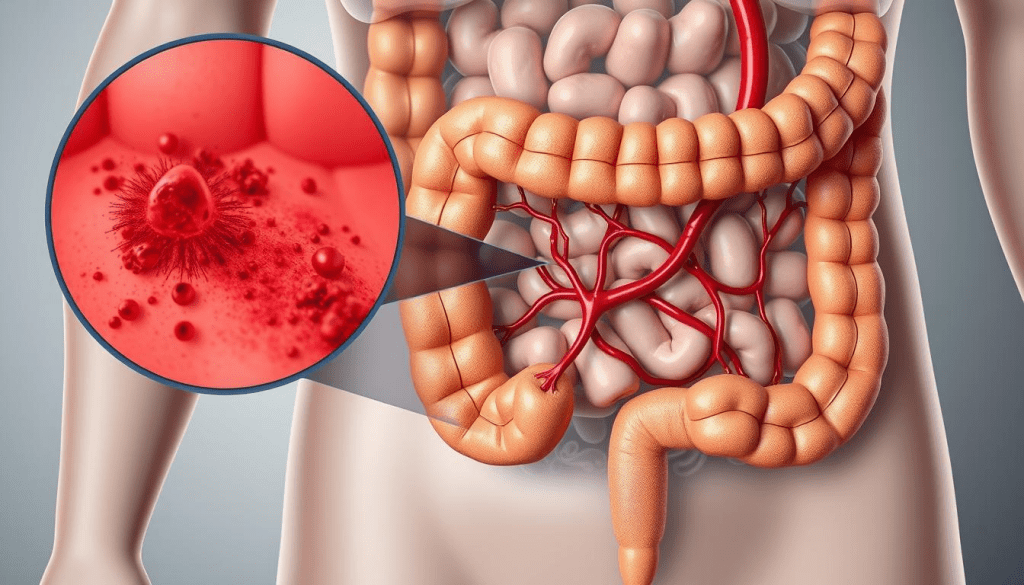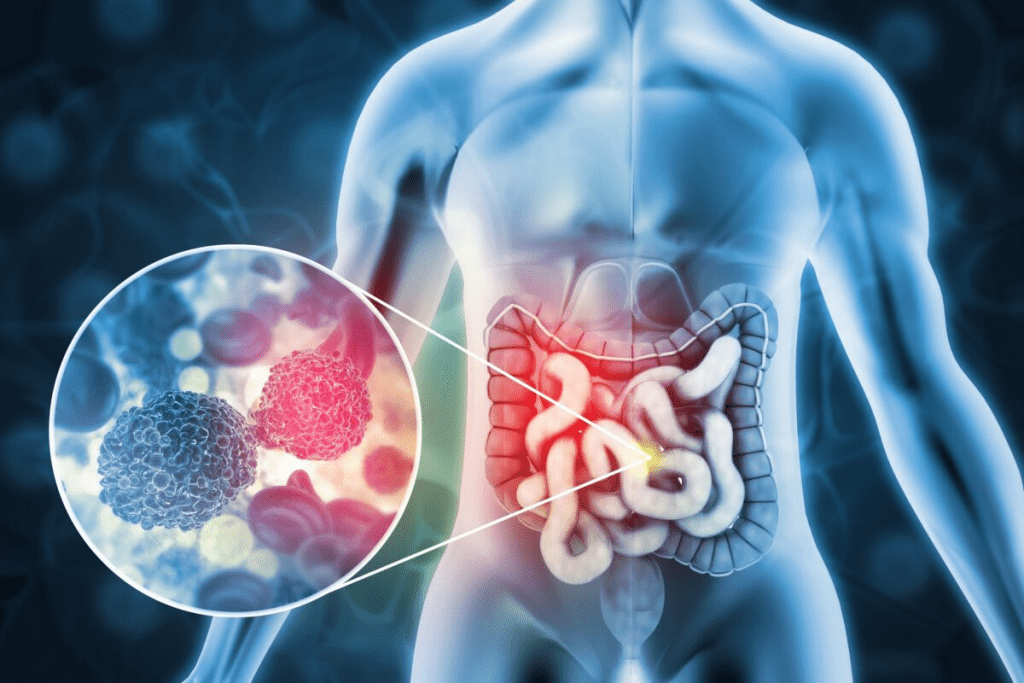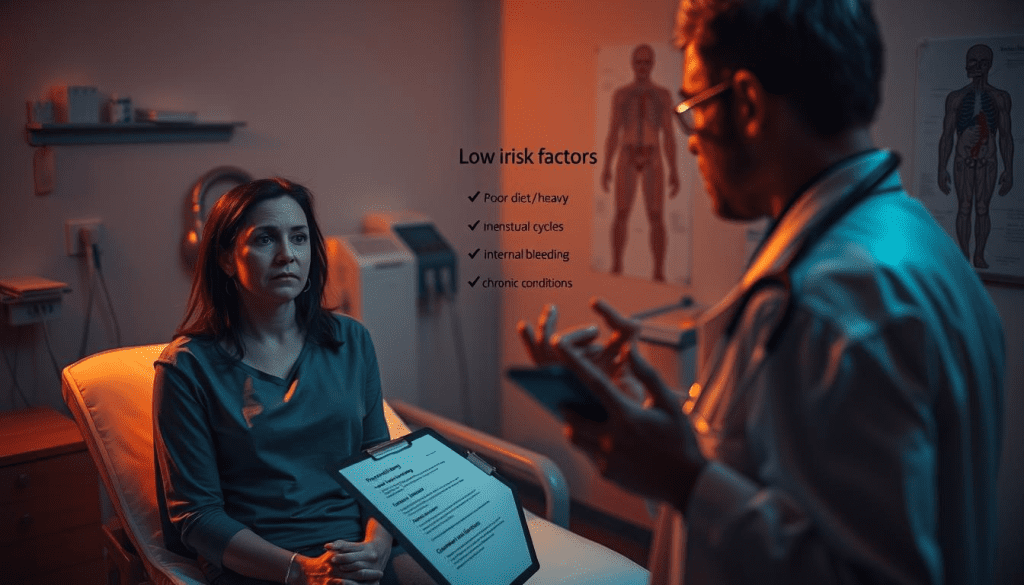Last Updated on November 13, 2025 by
Iron deficiency anemia is when you don’t have enough low hemoglobin. It can happen if you don’t get enough iron or if you lose blood too much. Studies show a strong link between iron deficiency anemia and colon cancer. This is scary because colon cancer is very common around the world.

The connection between anemia and cancer is complex. Anemia can be a sign of cancer, like colorectal cancer. Knowing about this link is key to finding cancer early and preventing it, mainly in people at high risk. What type of cancer causes low hemoglobin often includes leukemia, lymphoma, and multiple myeloma, leading to fatigue, weakness, and anemia.
It’s important to understand how iron deficiency and cancer are connected. Iron deficiency happens when the body doesn’t have enough iron. This is needed to make hemoglobin, a key protein in red blood cells.
Iron deficiency shows up in different ways. You might feel tired, weak, or have pale skin. You could also have trouble breathing.
Cancer can cause low iron levels in several ways. Tumors can bleed a lot, leading to iron loss. Inflammation can also mess with iron use in the body. Plus, the body needs more iron when cells are dividing fast.
For example, colon cancer can cause bleeding in the gut. This leads to iron deficiency anemia.
It’s key to spot the link between iron deficiency and cancer early. If you keep feeling low iron, get checked out. This could help find cancer sooner.
Iron deficiency anemia (IDA) happens when the body doesn’t have enough iron. This leads to less hemoglobin in red blood cells. Hemoglobin is key for carrying oxygen to the body’s tissues and organs.
Without enough iron, the body’s tissues and organs don’t get the oxygen they need. This causes health problems.
The symptoms of iron deficiency anemia vary but often include fatigue, weakness, and shortness of breath. Other signs are pale skin, dizziness, and headaches.
In severe cases, IDA can cause poor concentration, restless leg syndrome, and cold hands and feet. Spotting these symptoms early is key for getting the right treatment.
To diagnose iron deficiency anemia, doctors use physical exams, medical history, and lab tests. The main test is a complete blood count (CBC). It checks the levels of hemoglobin and other blood components.
Other tests, like serum ferritin and iron level tests, check the body’s iron stores. These tests help doctors figure out if it’s IDA or another type of anemia.
Knowing how to diagnose IDA is vital for doctors to create the right treatment plan. This usually includes iron supplements and eating more iron-rich foods.
What Type of Cancer Causes Low Hemoglobin Levels?
Low hemoglobin levels can signal serious health issues, including some cancers. Hemoglobin is a protein in red blood cells that carries oxygen. When it’s low, it can cause anemia, leading to fatigue, weakness, and shortness of breath.
Colorectal cancer is a common cancer linked to low hemoglobin. Tumors can cause blood loss, either visible or hidden. This loss depletes iron, causing anemia.
Chronic blood loss isn’t the only way colorectal cancer causes anemia. Tumors can also cause inflammation, affecting iron metabolism and leading to anemia.
Colorectal cancer isn’t the only cause of low hemoglobin. Gastrointestinal cancers, like gastric cancer, can also lead to anemia. Cancers that cause inflammation or affect bone marrow can lower hemoglobin levels too.
It’s important for doctors to find the cause of low hemoglobin, even in patients at risk for cancer. Early cancer detection and treatment can greatly improve outcomes.
Anemia is a big problem for people with colorectal cancer. It affects their life quality and how long they live. Anemia means not enough hemoglobin, a key part of blood.

Research shows anemia affects 30% to 75% of colorectal cancer patients at diagnosis. This range varies because of different cancer stages, locations, and patient characteristics. It shows anemia is a common sign of colorectal cancer.
Anemia’s link to colorectal cancer is very important. Finding cancer early is key to better survival and treatment. Seeing anemia as a cancer sign can lead to quicker diagnosis and treatment.
Early detection and management of anemia greatly improve life for colorectal cancer patients. Doctors need to know about anemia and colorectal cancer to give the best care.
Cancer can cause iron deficiency in several ways, like chronic blood loss and inflammation. Knowing how these happen is key to helping cancer patients with iron deficiency.
Tumors can lead to ongoing blood loss, which lowers iron levels. For example, colorectal cancers can cause hidden bleeding. “Chronic blood loss is a big reason for iron deficiency in cancer patients.” This bleeding might not be obvious, so it’s important to check regularly.
Inflammation from cancer can mess with how the body uses iron. Even with enough iron, inflammation can stop it from being used. “Inflammation makes it hard for the body to use iron, leading to anemia in cancer patients.” This shows how complex iron deficiency is in cancer.
In summary, iron deficiency in cancer patients is caused by many factors. Understanding these helps doctors manage it better in cancer patients.
Recent studies have uncovered a deep link between iron deficiency and cancer progression. This connection is key to understanding cancer prognosis and treatment.

A 2022 study looked into functional iron deficiency. This is when the body has enough iron but can’t use it well. The study found many cancer patients have this issue.
It showed how important it is to treat iron deficiency in cancer patients. This can improve their health and treatment results.
Studies have found that anemic cancer patients are at higher mortality risk. Anemia makes cancer treatment harder, leading to worse results.
It’s vital to understand how iron deficiency, anemia, and cancer are connected. By tackling iron deficiency, doctors can help patients avoid complications and get better.
In summary, the connection between iron deficiency and cancer is complex. More research is needed to understand it better and find the best treatments.
The place where a tumor grows in the colon is key to how anemia shows up in colon cancer patients. The colon’s shape and where tumors grow can change how anemia happens and how bad it gets.
Colon cancers are split into right-sided and left-sided types based on where they are in the colon. Right-sided colon cancers tend to cause anemia more because the right colon is wider. This lets tumors grow bigger before they block anything. On the other hand, left-sided colon cancers block sooner because the left colon is narrower.
The shape of the colon matters a lot in how tumors affect us. The vascular supply and the diameter of the colon change along its length. This affects how tumors grow and what symptoms they cause.
For example, tumors in the right colon often lead to hidden bleeding and anemia. But tumors on the left side might cause more obvious symptoms like changes in bowel habits.
Knowing about these anatomical details is vital for spotting and treating colon cancer right. Where the tumor is not only shapes the symptoms but also affects when the cancer is found.
Anemia is a key sign of colon cancer, but there are other symptoms to watch for. Colon cancer can show itself in many ways, some not so obvious at first.
Blood in the stool is a common and scary symptom of colon cancer. It can be seen or only found through tests. Blood in the stool means the tumor is bleeding, and you should see a doctor right away.
A medical expert says, “Blood in the stool is a critical warning sign that should never be ignored.”
“Visible blood in the stool is a clear indicator that something is amiss in the gastrointestinal tract.”
Other warning signs of colon cancer include changes in bowel habits. This can be diarrhea or constipation, or feeling like you didn’t finish going to the bathroom. Also, unexplained weight loss and stomach pain or discomfort are signs to watch for.
Knowing these colon cancer symptoms and talking to a doctor can help catch it early. This can lead to better treatment options.
Iron deficiency can come from many sources, not just cancer. We’ve talked about how cancer can lead to low iron levels. But, it’s key to look at other big causes too.
Gastrointestinal issues are a big reason for iron deficiency. Problems like celiac disease, ulcerative colitis, and Crohn’s disease make it hard for the body to absorb iron. Also, surgeries like gastric bypass can cause iron deficiency because they reduce how well the body absorbs iron.
What we eat is very important for iron levels. People who don’t eat meat or animal products often have trouble getting enough iron. This is because the body absorbs iron from animal sources better than from plants. Drinking a lot of tea or coffee can also make it harder to absorb iron.
Iron deficiency can also come from losing blood over time. This can happen for reasons like heavy menstrual periods, gastrointestinal ulcers, or taking too many NSAIDs that can cause stomach problems. Even giving blood regularly can lead to iron deficiency.
It’s important for doctors to know about all the reasons for iron deficiency. This helps them treat it better. By understanding these causes, people can take steps to keep their iron levels up and stay healthy.
It’s important to know when low iron levels are a concern. This helps in catching health issues early. Low iron can come from many reasons. Finding out why is the first step to fixing it.
Some things can make low iron more likely to be linked to cancer. A family history of cancer, like colorectal, is one. Also, having inflammatory bowel diseases like Crohn’s or ulcerative colitis is a risk. Eating a diet low in iron, smoking, and drinking too much alcohol can also raise the risk.
Age is a big factor in low iron levels. People over 50 are more at risk for colorectal cancer. So, if they have low iron, it’s important to check it out. Being careful in this age group is key to catch and treat problems early.

When patients show signs of anemia, doctors start a detailed process to find the cause. This is key to figuring out why someone has anemia. It could be due to iron deficiency or something more serious like cancer.
The first step is a complete blood count (CBC) and other blood tests. These tests show how bad the anemia is and hint at its cause. They look at hemoglobin levels, mean corpuscular volume (MCV), and red blood cell distribution width (RDW).
If blood tests point to iron deficiency anemia, more tests are needed. A gastrointestinal endoscopy might be done to find bleeding sources or other issues in the digestive system. Colonoscopy is also key for spotting colorectal cancer, a common cause of iron deficiency anemia.
Sometimes, imaging studies like CT scans or MRI are needed. These help find tumors or other problems that might be causing the anemia.
Diagnosing anemia involves a thorough approach. Doctors use blood tests, gastrointestinal procedures, and imaging to find the real reason for anemia.
Checking for iron deficiency is key because it might show early signs of health problems like colon cancer. The link between iron deficiency and cancer shows we need to act fast to diagnose.
Knowing about iron deficiency helps find and treat related health issues early. Doctors should look at iron deficiency as a sign of colon cancer, mainly in people at high risk.
By understanding iron deficiency, we can stay healthy. We should know the signs and risks of iron deficiency and see a doctor if we’re worried.
In short, looking into iron deficiency is vital for spotting health issues, including colon cancer. By focusing on awareness and education, we can help people stay healthy and get better care.
No, anemia doesn’t mean you have cancer. It can happen for many reasons, like stomach problems, not eating enough iron, or losing blood too much.
Bleeding is a common symptom of colon cancer. But, how often it happens can vary. Some people see blood in their stool, while others might only show signs through tests.
Yes, you can have colon cancer without bleeding. Some cancers might cause anemia from losing blood slowly, but you might not see any blood.
Low ferritin might mean you have iron deficiency, which could be a sign of cancer. But, it can also happen from not eating enough iron or from inflammation.
Yes, cancer can lead to anemia. This happens through losing blood, inflammation, and problems with iron use.
Anemia itself doesn’t directly cause blood cancer. But, some conditions that cause anemia might raise your risk of blood cancer.
Symptoms of colon cancer include blood in stool, changes in bowel habits, belly pain, and losing weight without trying.
Doctors use blood tests, like a complete blood count (CBC), to find iron deficiency anemia. They also look at your physical health and medical history.
Yes, not getting enough iron or not absorbing it well can lead to iron deficiency.
Colon cancer can lower hemoglobin levels. This happens from losing blood, inflammation, and problems with iron use, leading to anemia.
Subscribe to our e-newsletter to stay informed about the latest innovations in the world of health and exclusive offers!